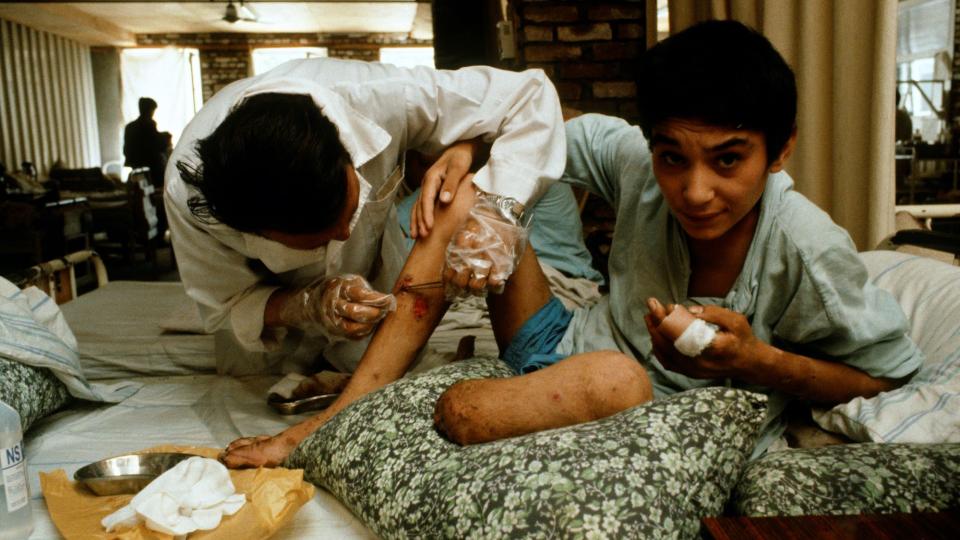New ICN report aims to improve nurses’ disaster preparedness, response and recovery

Coinciding with World Tsunami Awareness Day, the International Council of Nurses (ICN) today issued a newly updated guidance on how nurses should respond if they find themselves in a disaster situation. The new version of the Core Competencies in Disaster Nursing report outlines what nurses should know and be able to do for the effective prevention, preparedness, response and recovery from disasters.
Since 2010, more than 2.6 billion people have been affected by natural phenomena such as earthquakes, tsunamis, cyclones, heat waves, floods or other extreme events. These often lead to mass casualties with the potential to overwhelm local medical resources and have lasting effects on the health system.
ICN has worked with other global organisations to develop the Core Competencies for Disaster Nursing with the aim of improving disaster prevention, preparedness, response and recovery.
The guidance, which updates and supersedes previous versions, describes the competencies that nurses must have, depending on their personal career histories and expertise.
ICN President Annette Kennedy said:
“When these new competencies are adopted around the world it will mean that all nurses will be able to contribute effectively in disaster situations to ease the burden on their patients and communities.
I would like to take this opportunity to praise all of the nurses who have stepped up and helped out when people are at their most desperate and vulnerable – it never ceases to amaze me how nurses can not only provide essential care but can lead, coordinate and manage in the most challenging situations.
I would also like the thank the expert nurses who worked so hard to bring these competencies together into a powerful document that will guide nursing practice and education on this topic over the coming years.”
The competencies describe what the nurse should be able to do in a given situation, depending on his or her professional experience.
The Level 1 competencies are for all registered nurses, including staff nurses in hospitals, clinics and health centres, and all nurse educators.
The Level 2 competencies are for any nurse who has achieved the level 1 competencies and is or aspires to be a designated disaster responder within an institution, organisation or system.
The Level 3 competencies will be developed in the future. These are for nurses who respond to a wide range of disasters and emergencies and who serve on a deployable team.
The competencies are organised into eight domains:
- Preparation and planning - actions taken apart from any specific emergency to increase readiness and confidence in actions to be taken during an event
- Communication - approaches to conveying essential information within one’s place of work or emergency assignment and documenting decisions made
- Incident management systems - the structure of disaster/emergency response required by countries/organisations/institutions and actions to make them effective
- Safety and security - assuring that nurses, their colleagues and patients do not add to the burden of response by unsafe practices
- Assessment - gathering data about assigned patients/families/communities on which to base subsequent nursing actions
- Intervention - clinical or other actions taken in response to assessment of patients/families/communities within the incident management of the disaster event
- Recovery - any steps taken to facilitate resumption of pre-event individual/family/community/organisation functioning or moving it to a higher level
- Law and ethics - the legal and ethical framework for disaster/emergency nursing
The guidance was produced following a year-long review of current practice and previous documentation by an expert panel of nurses from around the world, which includes:
- Rowaida Al-Maaitah, BSN, MPH. DrPH - Professor, Jordan University of Science and Technology
- Lisa Conlan, BScN, MoN, DoN - Director of Pre-registration Programs, University of Sydney, Australia
- Kristine Gebbie, BSN, RN, MN, DrPH - Professor, Flinders University, Australia
- Alison Hutton, DipN, BN, Cert of Paed Nurs, MoN, PhD - Delegate, World Association of Disaster Emergency Medicine (WADEM)
- Joanne C. Langan, BSEd., BSN, MSN, PhD - Professor, Saint Louis University, USA
- Alice Yuen Loke, BSN, RN, MN, PhD, FAAN, FHKAN - Professor, Hong Kong Polytechnic University, Hong Kong
- Amanda McClelland, BNRN, Grad Dip, MPH, MBA - Senior vice President, Resolve to Save Lives
- Arwa Oweis, RN, DNSc - Regional Adviser for Nursing, Midwifery and Allied Health Personnel WHO, the Regional Office of the Eastern Mediterranean
- Kristine Qureshi, RN, CEN, PHNA-BC, FAAN, PhD - Associate Dean for Research and Global Health, University of Hawaii, USA
- David Stewart, BNRN, MHM - Associate Director, International Council of Nurses
- Virpi Teinilä, BScN, MPH - Officer, International Federation of Red Cross and Red Crescent Societies
- Tener Goodwin Veenema, PhD MPH MS RN FAAN - Johns Hopkins University
- Cynthia Vlasich, MBA, BSN, RN, FAAN - Director of Global Initiatives at the Honor Society of Nursing, Sigma Theta Tau International
- Aiko Yamamoto, RN, RNMW, PhD - Former Chair of the World Society of Disaster Nursing
Read the report here
Download the press release here
Photo credit: ICRC/Roland Bigler